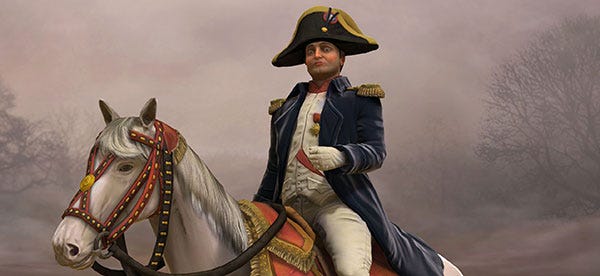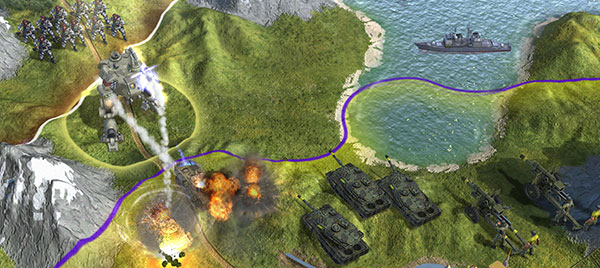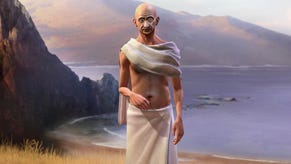Wot I Think: Civilization V
It's out in the US now, but in Europe we've got another two days on the clock. We have a different internet here, you know. It tastes of tea, bad teeth and snootiness. Perfectly understandable that they wouldn't want to see its like in America. Anyway, it's Tuesday, it's five o'clock UK time, and that means I'm going to tell you what I think of the latest slice of history-spanning turn-based strategy. I haven't made any Ghandi gags, though. Sorry about that. I know you were expecting them.
Perhaps the biggest perk of this job: getting to spend double-digit hours with a new Civilization game every few years, and not being made to feel guilty about it. If I sound too snarkily celebratory, that's because this in stark contrast to the original Civ, a title which caused my parents to criticise how long I spent playing games when I should instead be having my very soul drummed out of me by endless homework. Little did they know, those fools, those sensible fools, that I'd somehow go on to making a living (or something approximating it) from games, while incomprehensible graphs and a few basic Latin phrases have since been as useful to me as nipples on a jar of peanut butter. And also that I surely know far more about military and socio-political history as a result of playing Civ than that weird teacher with the dirty pockets and the hair like a badger could ever have taught me.
So here I am again, for what's roughly the eighth spin on the wheel of time, if you count Call to Power, Alpha Centauri and/or Civilization Revolution (a lot of people wouldn't). Civ V manages the perplexing trick of simultaneously spinning that wheel further than ever before, but also backwards. It switches around some pretty fundamental wiring, but at the same time feels less progressive and less game-changing than the justly revered Civilization IV.
I'm not going to re-document all the new stuff, as I've already done that here and here and it's really not fair to subject you to a four thousand word tour here. It adds up to a mix that works, that is inarguably Civ but encourages different thinking alongside more established tactics. You're still riding the same bike, but now it's got some cool new spokey-dokeys and bell that plays Little Spanish Flea.
The City States remain a particularly fascinating addition, offering the choice of running your tongue along a whole new strategy leg or giving you something to practice stomping to death while you gear up for a full-on global conquest. Not everyone's trying to rule the world, and the city states are Civ's first real reflection of that. At the same time, I totally welcome the option to turn the off, lending more of a land-grab feel to proceedings.
I've warmed hugely to the revised, semi-hex-based combat too. While in early sessions I was a mite frustrated by just how costly it became to assault a city, thanks to its built-in defence, I'm now a big fat fan of the more tactical approach. Civ battles are no longer about clumping units and rushing; they're about picking the best spots on the map, balancing close combat with ranged and using upgrades that boost other units' usefulness rather than simply to buff a single soldier. I've got a catapult safely back there lobbing rocks at that city, and in front of it is a line of longswordsmen who physically prevent an enemy just wandering over and trashing it. On that hillside, I've got an archer with a rough terrain bonus, in that field there's another with an open terrain bonus, and somewhere in the middle of this cluster of death I've arranged is a dude with a medic upgrade, churning out just enough health bonus per turn to stop enemy archers from quite killing off any of my units. I've read the terrain, I've mapped out the hexes surrounding my target, and I've turned it all into a weapon.
Oh, you're so going down, York. It's brutal chess deluxe, and as a result it feels that much more like an orchestrated war. By turn, when it goes wrong it tends to be in uexpected ways, a result of your military planning being a bit dicky rather than simply a question of might makes right.
Combat's probably the most developed system in the game, and that extends all the way out to even the graphics. For instance, probably the most charming thing I've seen in Civ V is the animation on the helicopter gunship. It's a dramatic-but-tiny barrage of machine gun fire and high-powered rockets, a 3-second loop that looks like a profoundly destructive act, whether or not it's happens to be achieving much. I didn't notice it for ages, having become accustomed to playing in maxi-zoom mode. An errant flick of the mousewheel eventually framed its delicately-rendered death-strike front and centre-screen, and I had a moment of awe about how much time, effort and gun-lust had gone into incidental visual touches. Someone made that helicopter machinegun firing animation and went home proud. Probably grinning like this, probably convinced it was the greatest helicopter machinegun-firing animation ever created. He's probably right. And he did all that for something that 90% of players will probably never notice, let alone think about.
That's Civ V's thing- lavishness. It's dangerous to kick off any game write-up harking on about how pretty the graphics are, but in Civ V's case it's genuinely integral to the game's appeal. It's not that it's hyper-graphics. It's that it's meticulously detailed, a crafted world rather than merely a glossy one. The units are on the fuzzy side, for instance, but as a whole it's this wide world of tiny, moving parts. Boardgame roots it might have, but this is Civ moving into being a living thing.
On the surface, at least. Underneath, this is as mechanical and inorganic as the series has ever been, thanks to a combination of streamlined systems, the vaguest vagaries excised, and AI so robotic that I swear I could hear the cogs ticking.
Case in point: It's not easy being peaceful. Civilization V does not entirely live up to its name, in that the last thing it wants to let you do is be civilised.
Even on the lower difficulty settings (sue me, I like to break myself in easy), other Civs will declare war on you, regardless of how aggressive you've been. They will do this without warning, they will do it without explanation and they will do it whether or not they're actually equipped to win it. Sometimes it's just a little pathetic, this angry little puppy snapping at the doors of your towering fortress. Sneer at it, then boot it into the sun. Sometimes, though, it's two armed-to-the-teeth megaCivs declaring war on the same turn when you're far from prepared for even one war, forcing you to turn your entire economy to muscle and totally disrupting any long-running plans for peace, space and politics.
Clearly, in any Civ you need to be adept enough at the game to have a fighting force ready to go at any time in the event of an argy-bargy, because pursuing a purely scientific or cultural path without diverting any gold, production and research into military resources makes you a big white bottom just begging to kicked. If a Civ scents weakness, it's going to take advantage. Totally fair. You would too, right?
Here though, the sheer scale of the aggression and moreover its opaque, unexplained randomness can on occasion force reloading an autosave from several turns back and preparing a bigger army. This is because the AI is so fixed/broken/cheaty/sadistic that the game appears to decide WAR! will happen on a certain turn. No matter how much you reload, savagery will be unleashed on that turn. No matter how many gifts you ply your rivals-to-be with, no matter how many open borders or trading agreements you set up, war will happen on that turn. Strategy doesn't matter. They can't be bargained with. They can't be reasoned with. They don't feel pity, or remorse, or fear. And they absolutely will not stop, ever, until you've nobbled enough of their troops that they panic and offer you all their Incense and horses.
It's a serious crimp on pursuing the other victory conditions, because you always need to be funnelling a ton of resource into a what-if army. A what-if army that summarily eats up massive maintenance costs. The cultural, scientific and political victories can, of course, be met - but only once you've crushed the most persistently bitey Civs under your heel, not because you've charmed them. This, coupled with a bug that caused another game to crash on a given turn, meant I've had to give up on a couple of games and start afresh.
Random spikes and machine-like behaviour are no strangers to Civ, and like spearmen being able to kill tanks, it's one of those classic wobbly bits that the series has always had - and always failed to fix. I think it's worse this time around - or at least more blatant. The blame for this I lie partially at the feet of the AI and partially at the feet of the watery Diplomacy system. While billed as Extreme Diplomacy, in fact it's a dramatic reduction of international politics – only the most feeling engagement with your rivals/allies/slightly surly neighbours. Trade yes/no, fancy a fight with that other guy yes/no, WAR. That's pretty much it, with the important exception of the Research Agreements – wherein you both throw some cash at a mutual scientific discovery project to be awarded in ten turns time, rather than directly trade tech tree branches.
I don't know what these guys are thinking about anything most especially about me. Gone is any useful designation of their current attitude towards you, outside of reading cheery or angry implications from their vague, bland greetings. No stats to say you've camped too close or you've spent too long nibbling France's earlobes. Just neutral trading, occasionally switching to sudden, unexpected murderousness. It's this aspect of the game that most requires improvement, for it gives no sense that the other Civs are Civs and, to be honest, it's so dry and streamlined that it's not particulary appealing an endeavour. I found myself far more prone to doing my own thing and keeping a bare minimum level of contact up with my sometime neighbours. Maybe that's why they kept declaring futile wars on me. But I doubt it.
There are several expansion pack-shaped holes in Civ V, and diplomacy's the largest of them. The next is religion, and then there's a smattering of smaller ones for social policies. With these, Civ veers ever so slightly towards RPG – defining your Civ as a build that much more, rather than pushing onwards to a silent target of your own . The effects of picking a policy are huge, and instant- a third more gold, or happiness, or a dramatic slowdown in the cooling of allied city state's ardour, or a huge boost to the effectiveness of soldiers on home turf.
The right policy or two can change the game, and while there aren't all that many ideal combinations (with some policies even blocking access to others) there's a whole lot of scope to make your nation a character, a favoured load-out that you err towards.
Or you could ignore them entirely; if you pick the military route you'll probably have to, because you won't be chucking out enough Culture to access new social policies. There's a lot more of that in this fifth Civ – features both small and large that are almost locked out if you don't pursue the relevant path. It makes it a bigger game in its way, more friendly to repeat play and exploration.
With arguably over-fussy complications removed, such as having to build separate boats to ferry units across seas (some folk love their ship-building, but I'm so much happier knowing that I don't have to wait another 14 turns just so I can tell my soldiers to go over there), it's also a more focused game than Civ IV became after two expansions. Despite the changes, there's a more classic Civiniess to this one, but not wholly in its favour. There is a vaguely sterile air to it, a greater sense that it's defined by maths. Which leads me to repeat my former feeling that this is thought of as a companion to the still-fresh Civ IV, not a replacement. It's trying out different directions rather than continuing along Civ IV's path. Directions very much worth exploring, and which push this firmly into "of course you're bloody going to buy it" territory, but I'm left wanting something a little more… meaty. Surprising. Organic.
I suspect that's going to happen anyway, thanks to the built-in mod browser/downloader. It's been next to useless in this review code, as there's no community out there pushing new content at the game, but give it a few weeks, months, years and there'll be a constant churn of new, wild stuff: new Civs, new maps, new rules, new units. All downloaded and installed into the game, from within the game. I suspect it'll quickly require better filtering systems, as the handful of categories and the most popular tab are going to damn a lot of good stuff to never see daylight, but if it goes to plan I can have a different Civ V experience every time I load the thing up.
Once players are around, the multiplayer will clearly fix my major reservations with the AI too. At least if someone's random, it's because they're a random psychopath or don't know the game – not because an invisible die has decided it's time to die.
Civ V's reliably done what every Civ game has ever done (with the possible exception of III): eat my time as unashamedly as a dog in a pork pie factory. I laugh a little when I look back at my complaints a few paragraphs up. I say those things because they must be noted, but it's not like they ever put me off playing. It's not like they stop me from being profoundly glad and satisfied that there's another Civilization icon winking cheekily at me from the desktop. I want it to be better, I want it to be bolder, I want it to address and improve the very foundations of Civilization, but it's sure as hell going to sit on my hard drive for months anyway. Yeah, this'll ultimately be remembered as one of the filler tracks on Civ's best-of LP, one of the ones you never quite felt had real heart, real soul - but it's a tune I'm more than happy to hum.
Think I'll play a bit more RUSE for now, though.
























